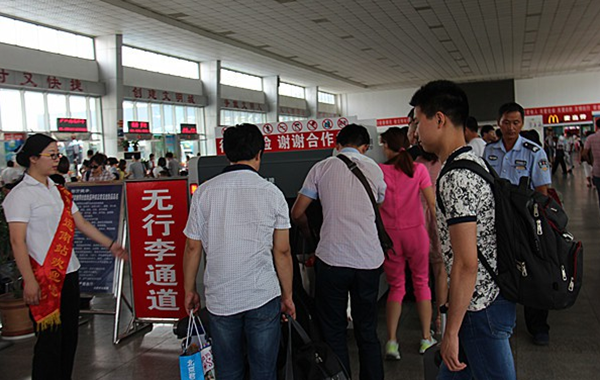Anhui moves against hidden hazards
By Ma Chenguang (chinadaily.com.cn) Updated: 2015-08-28 10:37
 |
|
Passengers at Hefei South Bus Terminal pass customs in an orderly way in Hefei on August 27 as Anhui takes full precautions against risks in hidden hazardous places. [Photo by Ma Chenguang] |
HEFEI: In the wake of the recent warehouse explosion in Binhai New Area in north China’s Tianjin and the landslide that buried the living quarters of a company in northwest China's Shaanxi, Anhui province has taken full precautions against the province's hidden hazardous places, making people's life and property safety its top priority.
Anqing, one of Anhui's 16 prefecture-level cities, sent six inspection teams to all areas of the city before August 19 and found 43 enterprises making hazardous chemicals. They closed 11 of them and asked 15 others to stop production until safety standards are met.
So far, the Tianjin blast has killed 145 people, while the Shaanxi landslide has left dozens missing, heightening awareness for the need of better safety across the country.
Anqing City Bureau of Work Safety chief Cheng Jieshu said the six inspection teams examined 2,473 firms and analyzed 922 places with hidden risks, while Anqing Party chief Yu Aihua ordered the inspection teams to investigate firms one by one and close those firms unable to meet standards in a timely manner, in a bid to remove any risks to people's life and property.
On August 24, Anhui provincial leaders inspected four areas in Hefei, including the Daxingji Wharf in Yaohai district, Feilong Gas Station in Feidong county, Anhui Hong Sifang Company of China National Salt Industry Corporation and Hefei South Bus Terminal, asking company officials to take every measure to prioritize the safety of life and property.
Earlier, on August 14, the Anhui provincial government convened a plenary session, telling mayors of 16 cities and other department chiefs that they must learn lessons from the recent catastrophes, prioritizing the safety of residents' life and property. Besides checking hazardous chemicals, emphases should be put on the safety of urban and rural oil and gas stations, food and medicine.
The meeting disclosed that there are currently 64 known places with hidden hazards in Anhui, and one example is the potential risk of oil and gas pipelines in southwestern Anhui's Anqing, which pass through the city proper and are owned and operated by the Anqing Petrochemical General Factory of China Petrochemical Corporation (Sinopec Group).
The mammoth plant, built in 1974 bordering the upper stream of the Yangtze River with an oil refining capacity of 8 million tons per year, now has three pipelines operating in Anqing - a crude oil input line, finished oil output pipeline and gas pipeline, and it occupies a third of the city, with parts of the pipelines passing by schools and hospitals.